SOLVING THE PROBLEM OF VIOLENCE IN OUR SCHOOLS
The problem of violence in our country's schools is greater than Jonesboro, Arkansas, and Littleton, Colorado. Dangerous expression of anger is in our schools, on our playgrounds, and in our homes. Children from apparently good homes talk and act out violently more frequently and very differently than children of a generation ago. If they grow to adulthood with such bombastic needs for power and control, our future and theirs may indeed be even more troubled. Jonesboro and Littleton are the horrific symptoms that abruptly brought the problem to our attention. We can and must attend to it.
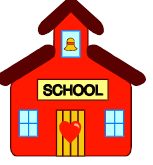
THE CAUSES AND
WHAT WE CAN DO
There are no easy fixes for such complex problems. It is time to critically examine probable causes and attempt to make critical changes. The causes and the changes involve home, school, and the community. In the words of Dr. John Mueller, former President of Johns Hopkins University, "Freedom without responsibility is animal anarchy." The violence that has erupted in our schools may be related to freedom without responsibility. Here are a few probable causes and a start for solutions:
Overempowered Children. Parents need to lead and take charge of their children. If you visualize the letter V as a model for guiding the extent of power and freedom given to children, you can raise your children to feel less angry and more secure. When children are very young, they should begin at the bottom of the V with limited freedom and power and a few choices. As they grow in maturity and are able to handle more responsibility, the limiting walls of the V widen giving them gradually increasing freedom, power, and choices while still providing parental limits.
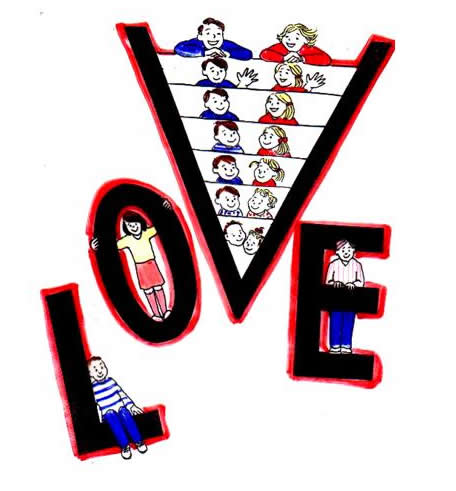 In too many families in our nation, the V is reversed to look like this: (insert inverted V here)
Children who start at the base of this figure are given too much freedom, too much power, too
many choices, and no limits. They become accustomed to having power and making decisions
before they have the wisdom to handle their freedom responsibly. As parents watch them make
poor choices, they try to protect their children and redirect their choices. They try to set limits,
but it's too late. Adolescents who had too much power as children now feel overcontrolled by
parents. Their angry statements reflect their feelings of restriction. "My parents are controlling
me," these adolescents complain. They rebel, feel increasingly angry, or are depressed. Not only
do they fight their parents, they fight their schools and their more positive peers.
In too many families in our nation, the V is reversed to look like this: (insert inverted V here)
Children who start at the base of this figure are given too much freedom, too much power, too
many choices, and no limits. They become accustomed to having power and making decisions
before they have the wisdom to handle their freedom responsibly. As parents watch them make
poor choices, they try to protect their children and redirect their choices. They try to set limits,
but it's too late. Adolescents who had too much power as children now feel overcontrolled by
parents. Their angry statements reflect their feelings of restriction. "My parents are controlling
me," these adolescents complain. They rebel, feel increasingly angry, or are depressed. Not only
do they fight their parents, they fight their schools and their more positive peers.
Their worried parents overpunish and narrow limits further, resulting in even more anger and rebellion. The defiant adolescents then turn their homes and schools into armed camps. Neither the parents nor the teens understand or communicate with each other. Relative to the power and control these teens once had, they feel powerless. Once freedom is given, it isn't easily taken away. Children brought up with the inverted V of Love expend their angry energies trying to recover the power they had been given too early. Parents do need to take charge from the beginning, and they may indeed need help in learning how to parent. Research has long told us that authoritative parenting, neither too authoritarian nor too liberal, provides the best adjustment for children. Authoritative parenting gives parents leadership, but children's concerns are heard and their interests heeded by caring, loving parents.
Put-Down Parenting. Competition invades our families. Although parents usually try to do their best, they may not agree on their values about parenting. One parent may prioritize being a friend to the child as most important. The other parent may believe that setting high standards of discipline is first priority. They may unconsciously compete which each other to feel like the better parent, thus making the other parent feel helpless and angry.
If children face parents who have contradictory expectations, and they lack the confidence to meet the expectations of one of the parents, they turn to the other parent who not only unconditionally supports them but accidentally teaches them the "easy way out." The kind and caring parents, without recognizing the problem they're causing their children, unintentionally overprotect their children when they face challenge. When children have grown up in an environment where one adult has provided an easy way out for them, they believe they can ignore the parent who expects them to be responsible. Thus, one parent sides with the child against the other parent, unintentionally giving them permission to be disrespectful to the first parent.
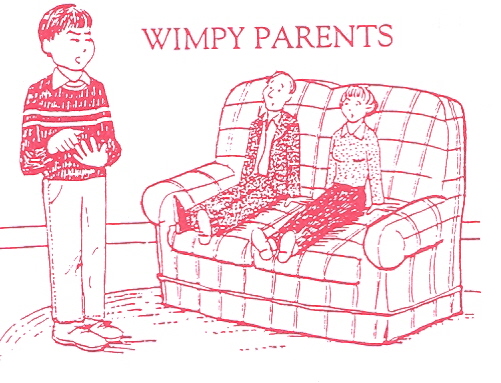 Obviously, the complexity and "put-downs" can increase when there are three or four parents
involved. After divorce, parents are more likely to believe they can tempt children to love them
by protecting them the most, doing too much for them, or buying them more. Furthermore, they
may be openly disrespectful of the other parent. If parents can be supportive to each other and
united in their expectations, children are much more likely to respect their parents and other
authorities as well.
Obviously, the complexity and "put-downs" can increase when there are three or four parents
involved. After divorce, parents are more likely to believe they can tempt children to love them
by protecting them the most, doing too much for them, or buying them more. Furthermore, they
may be openly disrespectful of the other parent. If parents can be supportive to each other and
united in their expectations, children are much more likely to respect their parents and other
authorities as well.
No time to talk or listen. Lives that are too busy leave little time for listening to children's problems. Lack of time also prevents adults and children alike from acting thoughtfully. Overreactions and anger become common communication. It takes time to talk and listen to problems and to formulate reasonable solutions to those problems.
It also takes time and energy for parents to say "no" rationally and follow through with reasonable consistency. Parents tell me they permit children to "get away with" terrible behaviors because they are simply too exhausted to set reasonable limits and follow through. It seems easier to "look the other way" and deny the problems. As a society, we must find time to raise our children.
A Deluge of Media Violence. Irresponsible television, video games, Internet, films, and
musical violence pay off and make millions of dollars for producers. Even vulgar disrespect of
parents and teachers on television is paraded as 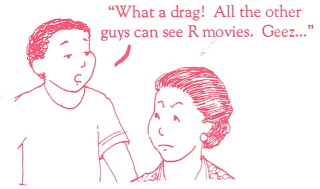 first-class humor for kids. Kids no longer know
the difference. Their senses are numbed to violent language, murders, and continued killing. The
disrespectful are admired as "cool," and murderers are not caught or punished.
first-class humor for kids. Kids no longer know
the difference. Their senses are numbed to violent language, murders, and continued killing. The
disrespectful are admired as "cool," and murderers are not caught or punished.
The romanticism and kindness of former generations have no attraction to "cool" young people, and the Internet holds a power for them that their parents often feel helpless to monitor. It's time to take television sets and computers out of children's bedrooms and place them in family rooms where parents can monitor what their children watch. It is time for television creators of violence to channel their creativity toward enriching instead of destroying our lives.
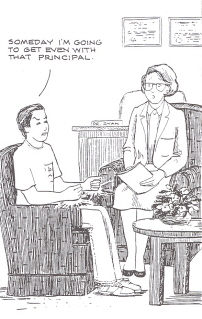 Kids With Problems. There have always been kids with problems and kids who feel different.
Parents could insist that they get help, but now parents ignore and even fear their angry children.
"Let the schools solve the problems," they say in desperation. "We can't force our children to go
for help; it's their choice."
Kids With Problems. There have always been kids with problems and kids who feel different.
Parents could insist that they get help, but now parents ignore and even fear their angry children.
"Let the schools solve the problems," they say in desperation. "We can't force our children to go
for help; it's their choice."
Parents and schools have the heavy responsibility of identifying children's problems, their isolation, or anger, and seeking the professional help to redirect children's energies, to support them through their struggles, and teach them a kinder, gentler way to cope with their conflicts.
* * * * *
America, we have a complex and horrendous problem. We must mobilize our families, our schools, communities, and the media to diminish the violence and restore safety to our homes, schools, and neighborhoods. We can and we will.
©2010 by Sylvia B. Rimm. All rights reserved. This publication, or parts thereof, may not be reproduced in any form without written permission of the author.
